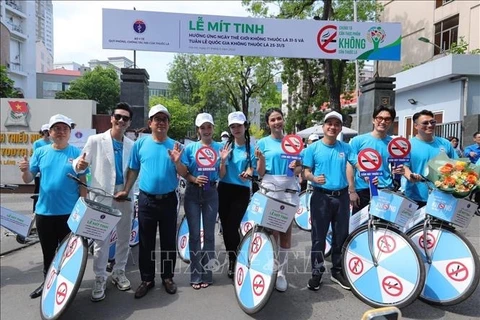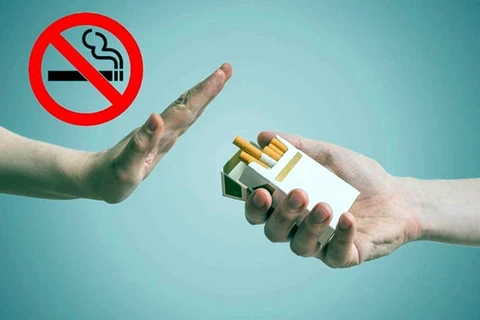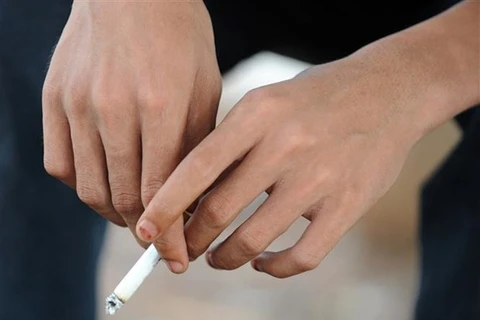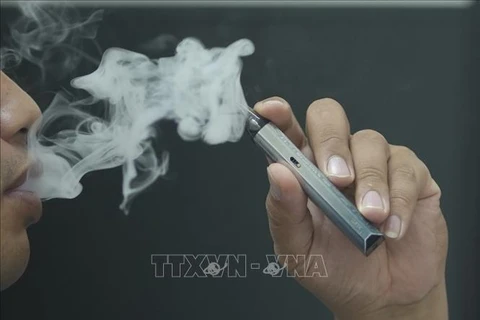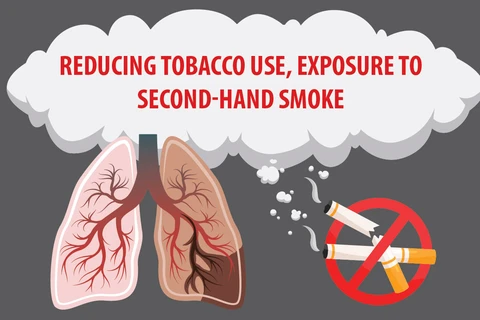 Experts discuss the necessity of establishing a legal framework to control new-generation tobacco products at a seminar held by VietnamPlus newspaper in Hanoi on August 21. (Photo: VNA)
Experts discuss the necessity of establishing a legal framework to control new-generation tobacco products at a seminar held by VietnamPlus newspaper in Hanoi on August 21. (Photo: VNA) Speaking at a seminar on building legal barriers to new tobacco products organised recently in Hanoi by VietnamPlus newspaper, they argued that without proper regulation, new tobacco products could become a shortcut, making it easier for young people to access and consume tobacco.
Dr Nguyen Huy Nga, Director of the Center for Health Environment Research and Development (CHERAD) and former director of the Ministry of Health’s Preventive Medicine Department, presented the results of an independent survey on the prevalence of new tobacco products among young people.
The survey, conducted on 1,000 students aged 12 to 17 in Hanoi, showed that 18.4% had tried e-cigarettes, with 13.8% currently using them. Meanwhile, 4.5% of students had tried heated tobacco products, and 3.2% were still using them, primarily among high school students.
Specifically, 12-year-old students did not use heated tobacco products, but 5.5% of 17-year-olds were using them. 12-year-old students preferred e-cigarettes, with 9.7% using them. This percentage among 17-year-old students was 17.6%.
Notably, the survey showed that most students were aware of the harmful effects of tobacco, yet the proportion of those who had smoked cigarettes or used new tobacco products accounted for 21.3%. The majority of students tended to believe that e-cigarettes and heated tobacco were less harmful than traditional cigarettes.
In response to these findings, Nguyen Nho Huy, Deputy Head of the Ministry of Education and Training’s Physical Education Department, emphasised the need to enhance awareness about the dangers of new tobacco products.
Huy said the Ministry of Health should conduct comprehensive research covering economic, social, national security, environmental, and health aspects, as well as ethical education for young people.
“This groundwork will serve as the basis for presenting solutions and legal documents to the Government and parliament in order to amend the Tobacco Harm Prevention Law for new tobacco products, establishing a legal framework to prevent and minimise the access of young people to these products,” he said.
Dr Hiroya Kumamaru, Deputy Director of AOI General Hospital in Japan, presented the results of a 2021 survey sponsored by the Japanese Ministry of Health, Labour, and Welfare and conducted by a group of healthcare experts.
According to this survey, the use of traditional cigarettes, heated tobacco products, and even e-cigarettes among junior high school students was very low, almost reaching a rate of 0%. Specifically, the usage rate of heated tobacco products among high school students was only 0.1%.
The expert said the Ministry of Health was not concerned about the risk of new-generation tobacco products among young people due to strict regulations.
Ban on new tobacco products
Le Dai Hai, Deputy Head of the Ministry of Justice’s Civil and Economic Law Department, stated that traditional cigarettes, e-cigarettes, or heated tobacco products all fell under the category of conditionally regulated business items according to the Investment Law, rather than prohibited items.
However, there was currently a specific legal gap in the management of these products, making it easier for users to access illegally imported new tobacco products, he added.
Hai also noted that the rate of young people experimenting with new tobacco products was on the rise. Therefore, there must be a legal framework to manage these products.
Le Dinh Phuong, Head of the General Internal Medicine and Family Medicine Department at FV Hospital, said that a complete ban on new tobacco products was not feasible because, by the time such a ban was imposed, these products might have already proliferated in the black market.
According to Phuong, the law was currently lagging significantly behind practical realities. A clear understanding of the benefits and harms of new tobacco products was essential when crafting legislation.
As an educational expert, Nguyen Nho Huy strongly advocated for an absolute ban on young people using these products.
Sharing the same viewpoint, Nguyen Huy Nga said that it was essential to prohibit students from smoking at schools to have strict penalties for violators.
Dr Kumamaru also shared Japan's experience, in which students under 18 were not allowed to smoke anything, whether it was traditional cigarettes, heated tobacco products, or e-cigarettes. Those who were found to violate the law would face heavy sanctions, even expulsion.
Hai emphasised the need for stringent management of all tobacco products to prevent their presence in schools. He underscored that preventing students from accessing tobacco was clearly defined in the Tobacco Harm Prevention Law.
However, enforcement remained weak due to a lack of specialised enforcement agencies.
From a legal perspective, Hai said that creating a legal framework for new tobacco products would better control the quality of products. He also affirmed that all tobacco products were harmful, but consumers of legal smoking age could have less harmful choices.
"It's time for relevant authorities to urgently revise and supplement legal documents to tightly manage these products," he recommended./.
VNA
